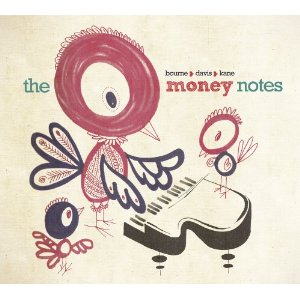
by Tim Owen
March 23, 2011
/ ALBUM
Its humour is tempered with experimentation; its irreverence with impeccable musicianship. I can't imagine ever tiring of it.
Matthew Bourne, Steve Davis, Dave Kane
“The Money Notes”
(Foghorn)
This is the same trio that backed Paul Dunmall on the excellent Slam release “Moment to Moment” in 2009. But whereas the Slam was a more-or-less typically gravid, heavyweight improv session, The Money Notes is much brighter; a piquant miso soup, if you will, to Moment to Moment’s hearty winter broth. It’s an album characterised by playful invention, as the chipper cartoon hens on the cover might suggest, but it’s played with a transformative sensitivity.
This is an album of instant appeal. Many of its tunes are playful, and some are little more than fragmentary sonic amuse-bouche. “Pedagogophillia”, for instance, shapes up not unlike an acid-jazz era Blue Note favourite such as Lee Morgan’s “Rumproller”, but stops abruptly before it’s become anything more than that notion. “Gunn” likewise has an instantly appealing start, but then it’s nothing more than a long decaying chord, all over in 53 seconds. Six of the album’s 22 tracks last less than one minute; a further six last less than two. All of these short pieces plus four others were fully improvised. Just six of the remaining pieces are compositions, one or two from each of the participants. There’s also a solitary cover, of which more later.
The two pieces composed by pianist Matthew Bourne bookend the album. “BDK Theme” is light and playful at the outset, gets a bit stuck in a rut with some strangulated scat singing, is rescued by a new nursery-rhyme-like theme from Bourne, and is finally restored to its original buoyancy by the reprise of its theme; and all this in a couple of minutes. “Peace for Ben Cundale” is a total contrast; a limpid, vaguely mournful ballad, sensitively served by drummer Steve Davis’ brushwork. These contrasting tracks serve as the album’s pole stars.
Steve Davis’s sole composition “Hive Activity” is well titled, a knotty and somewhat convoluted bed of percussives that Bourne initially weaves around, then takes a firm grip on and asserts a wonderful solo. At 20 seconds shy of seven minutes, bassist Dave Kane’s “Old Gregg” is the album’s epic, and a chance for the trio to develop a theme. It has something of the flavour of Count Basie’s “One O’Clock Jump”, and develops as a mostly restrained showcase for Bourne. Another Kane tune, and an album highlight, “Scuttler No. 2” has an abstracted Latin flavour. Beginning as a light-fingered exercise for Davis, its latter half features Bourne rippling through the piano’s upper register with dazzling rapidity.
Some of the shorter pieces are mood exercises, some of them nicely formed, such as the hesitant “Know”, while others are barely more than tentative first steps. There’s very little filler, however; in the scrapbook quality of the album lies a great deal of its charm. There’s much to enjoy even in the most tentative pieces. “Mandrake”, for instance, begins as a probing keyboard exercise, but the group switches mood neatly behind some raw scat singing (actually little more, here, than a strangulated scream); its peculiar conclusion makes something novel from what could have amounted to little or nothing. “Needles”, a brief interlude of piano-innard tickling, is very well named. There are many more such off-the-cuff originalities, with a few more outbreaks of scat singing among them. These moments will be the ones that stick in a first-time listener’s ears, but they shouldn’t obscure the more considered playing that they punctuate.
The longer joint compositions feature some of the trio’s best collective and individual work. Bourne is at his lyrical best on “The Money Notes”, while “More Money Notes” has a poignant, truly lovely, Satie-like delicacy. The cover version I mentioned earlier is a rendition of Joe Harnell’s"Lonely Man”. It is played straight, in a deeply moving rendition. The absence of any hint of irreverence is all the more remarkable when one considers the tune’s origin as a theme for the ?70s television series The Incredible Hulk. Of course, the following “Utter Contempt For All Those Who Scat Whilst Soloing” breaks the spell, with the trio romping through a collective solo, scatting as they go. Next in this track sequence, “No Money Notes” somehow reconciles the two preceding moods. It’s an extraordinary, ambivalent piece, and one I find myself drawn back to again and again. The collection to which the track lends its name has something of everything, yet it’s fully coherent as an album. Its humour is tempered with experimentation; its irreverence with impeccable musicianship. I can’t imagine ever tiring of it.
blog comments powered by Disqus